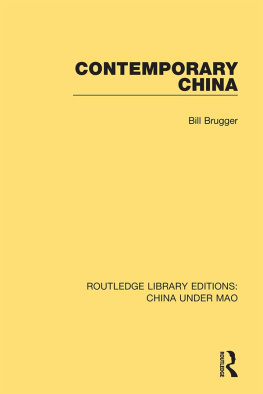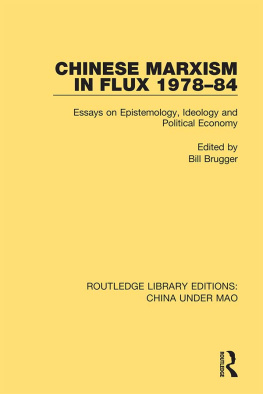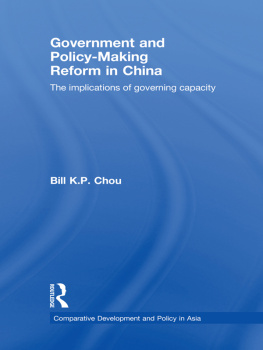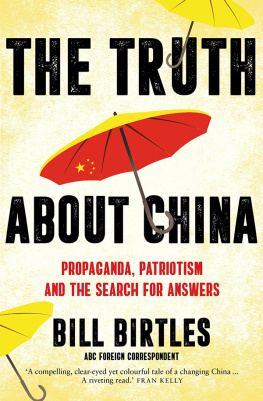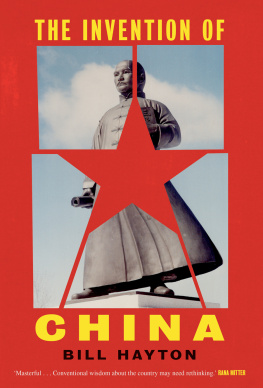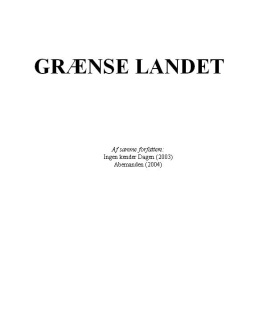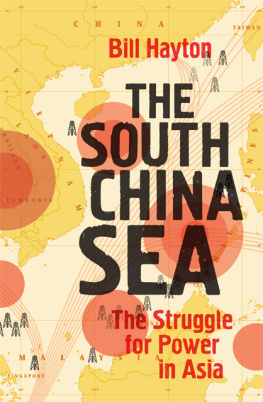First published in 1980 by Croom Helm Ltd
This edition first published in 2019
by Routledge
2 Park Square, Milton Park, Abingdon, Oxon OX14 4RN
and by Routledge
711 Third Avenue, New York, NY 10017
Routledge is an imprint of the Taylor & Francis Group, an informa business
1980 Bill Brugger
All rights reserved. No part of this book may be reprinted or reproduced or utilised in any form or by any electronic, mechanical, or other means, now known or hereafter invented, including photocopying and recording, or in any information storage or retrieval system, without permission in writing from the publishers.
Trademark notice: Product or corporate names may be trademarks or registered trademarks, and are used only for identification and explanation without intent to infringe.
British Library Cataloguing in Publication Data
A catalogue record for this book is available from the British Library
ISBN: 978-1-138-32344-5 (Set)
ISBN: 978-0-429-43659-8 (Set) (ebk)
ISBN: 978-1-138-34106-7 (Volume 4) (hbk)
ISBN: 978-0-429-44037-3 (Volume 4) (ebk)
Publishers Note
The publisher has gone to great lengths to ensure the quality of this reprint but points out that some imperfections in the original copies may be apparent.
Disclaimer
The publisher has made every effort to trace copyright holders and would welcome correspondence from those they have been unable to trace.
CHINA
Since the
GANG OF FOUR
EDITED BY BILL BRUGGER
1980 Bill Brugger
Croom Helm Ltd, 2-10 St Johns Road, London SW11
British Library Cataloguing in Publication Data
China since the Gang of Four.
1. China Social conditions1976
I. Brugger, William
309.15105 HN733.5
ISBN 0-7099-0203-4
Printed in Great Britain by
Biddles Ltd, Guildford, Surrey
Events in China, since the demise of the Gang of Four in October 1976, have given rise to a debate amongst scholars as intense as that which accompanied the beginning of the Cultural Revolution in 1966. A host of questions has been asked. Has the Chinese commitment to revolution undergone a fundamental change or have Chinas leaders simply been reacting to the ultra-left idealism generated in the Cultural Revolution? Since socialism may not be built in a state of generalised want, is the current stress on developing the productive forces the only possible socialist strategy? On the other hand, is such a stress an impermissible separation of means and ends? Was Trotsky right in seeing the development of the productive forces as a necessary precondition for ending bureaucratism or was Weber right in seeing such development as the very cause of bureaucratism? What, moreover, is the nature of that bureaucratism? Is it just a deformity, as Trotsky believed, or is it capable of generating new classes, as the Gang of Four believed? If we accept the latter, then what was wrong with the strategy of the Gang? Were they competent theoretically but incompetent politically or is it impossible to make such a separation? Is it true that the present leadership has rejected all of the Gang of Fours arguments and, along with them, those of the late Chairman Mao or have certain leaders made merely a selective rejection? What, therefore, are the policy cleavages among those leaders? Perhaps the policy cleavages are not, in fact, very important and, for all the rejection of the Gang, we are merely seeing another version of the same strategy. If this is so, how may we best conceptualise the Chinese social system? Are concepts like Stalinism, totalitarianism, state capitalism or even socialism itself much use?


